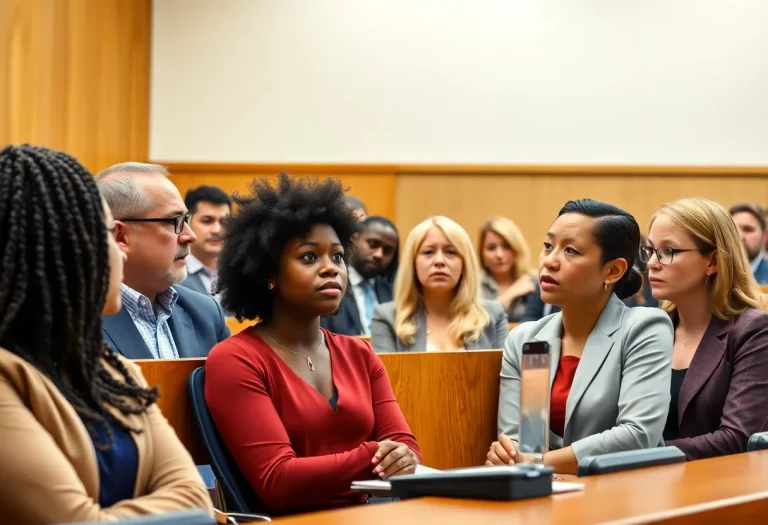News Summary
In St. Paul, Minnesota, a federal courtroom held important discussions regarding transgender athletes’ participation in high school softball. The group Female Athletes United has filed a lawsuit against the state and the Minnesota State High School League, arguing that allowing transgender girls to compete violates Title IX. The case has sparked intense debates about fairness in sports as the judge prepares to make a pivotal decision that could impact the upcoming softball season and the future of transgender participation in high school athletics.
St. Paul Hosts Vital Hearing on Transgender Participation in High School Softball
St. Paul, Minnesota, was the center of an important legal discussion this past Wednesday, as a federal courtroom buzzed with debate over a hot-button issue: the participation of transgender athletes in high school sports. With emotions running high, a group known as Female Athletes United took legal action against the state, the Minnesota State High School League (MSHSL), and several school districts. The lawsuit has stirred up conversations not just in sports circles, but in households and communities across Minnesota.
The Crux of the Controversy
At the heart of the lawsuit is a claim that allowing transgender athletes to compete in girls’ softball undermines a significant law known as Title IX. This federal law is designed to ensure equal opportunities for girls in sports and education. The plaintiffs are asking for a preliminary injunction, which would temporarily bar transgender athletes from participating in the Spring 2026 high school softball season. This lawsuit came on the heels of a notable victory by Champlin Park High School’s girls’ softball team, where a transgender athlete played a critical role in their success during the Class AAAA girls’ softball state championship. If the ruling favors the plaintiffs, it may result in the Champlin Park pitcher losing eligibility for the upcoming season.
Arguments Emphasized in Court
The attorney representing Female Athletes United argued that Minnesota’s current policy creates a playing field that is not level, suggesting it violates the principles of Title IX. The legal team has been vocal about the discrepancies they perceive regarding gender identity and biological sex. On the other side, state attorneys raised concerns about how the plaintiffs refer to transgender girls as “male athletes,” a term that they argue undermines the complexities of gender identity.
Further complicating matters, the lawsuit includes testimonies from high school girls from Maple Grove and Farmington who have played alongside the transgender athlete. These young girls expressed feelings of unfairness and discouragement, suggesting that competing against transgender athletes had negatively impacted their sports experience. For the lawsuit to proceed successfully, the plaintiffs must convince the court that they have genuinely suffered personal harm due to these competitions.
The Possible Outcomes
The judge’s decision on whether to grant the injunction could significantly affect the upcoming softball season. If the court opts to side with the plaintiffs, it will mean immediate changes for the league. On the flip side, if the judge denies the request, the case will continue to unfold over time without any immediate effect on the spring softball season.
A Broader Context
This case, initiated earlier this year in May, is part of a wider conversation about the treatment and inclusion of transgender athletes in sports. It highlights ongoing debates about fairness and equity in competitive settings. The arguments exchanged in court further illustrate the complex balance between protecting the rights of transgender individuals and upholding Title IX. Proponents of Minnesota’s existing policies argue that they align with state human rights laws protecting transgender athletes from discrimination, while the opposition claims there is a lack of evidence to support the notion that transgender athletes hold unfair advantages.
What Lies Ahead?
The judge, Eric Tostrud, has yet to issue a ruling but assures all parties that a written decision is forthcoming. As the case unfolds, communities across Minnesota are sure to keep a watchful eye. In recent months, the spotlight on transgender athletes in sports has intensified, especially with the political climate shifting, where federal funding cuts have been used as a threat to states resisting bans on transgender participants. The MSHSL’s current guidelines, established in 2015, permit students to compete in accordance with their gender identity, a move celebrated for promoting inclusivity but scrutinized in light of recent events.
If granted, the injunction could lead to increased oversight of female athletes, which raises new questions about privacy and bodily autonomy. As the legal battles continue, one thing is for sure: the discussions surrounding transgender participation in sports are just beginning, making it an issue worth following closely.
Deeper Dive: News & Info About This Topic
LIVE BALL Resources
Minnesota Girls High School Tennis Welcomes Third Class
Transgender Athlete Sues Swarthmore College and NCAA
Transgender Woman Files Lawsuit Against NCAA and Swarthmore Over Exclusion from Women’s Track Team
Las Cruces Celebrates Fall Sports Media Day
Transgender Athlete Evie Parts Sues NCAA and Swarthmore College Over Discrimination Claims
Minot Celebrates 2025 Scholarship Winners in Golf
2025 Wyoming High School Golf Season Kicks Off
Jurupa Valley Honors Transgender Athlete Amid National Debate
Charlottesville Showcases Resilience at Masters Championships
Minnesota High School Girls Tennis Introduces New Class
Additional Resources
- KARE 11
- Wikipedia: Transgender Athletes
- Star Tribune
- Google Search: Title IX Transgender Athletes
- FOX 9
- Google Scholar: Transgender Athletes Policies
- FOX News
- Encyclopedia Britannica: Gender Identity
- Minnesota Reformer
- Google News: Transgender Athletes Sports


